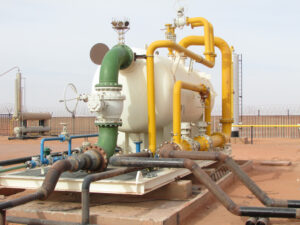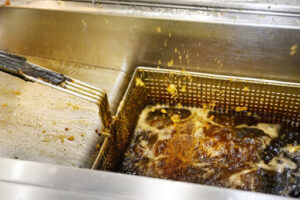Running a business isn’t for the faint of heart. Your day is often a juggling act, with phone calls, emails, customer questions, and unexpected problems all competing for your attention. It can feel like there’s always a new fire to put out, and certain tasks inevitably get pushed to the side. Grease disposal is one of those behind-the-scenes responsibilities that rarely gets the spotlight.
But here’s the thing: how you handle grease waste doesn’t just affect your plumbing. It has a ripple effect on the health of your community and the environment as a whole. If you’ve ever wondered how proper grease disposal helps the environment, or why skipping it can cause big problems down the road, you’re in the right place.
Why Grease Is a Bigger Problem Than Most Realize
Grease, fats, and oils are byproducts of cooking that seem harmless at first. In liquid form, they look like something that will just wash away. But as they cool, they thicken and stick to surfaces, creating stubborn blockages in pipes. This is bad news for your plumbing, but the real trouble begins once that grease leaves your kitchen.
Once grease enters sewage systems, it can cause massive clogs that lead to backups, overflows, and even public health hazards. If it finds its way into rivers, lakes, or oceans, the damage multiplies. Grease is harmful to the environment because it disrupts water ecosystems, harms wildlife, and pollutes drinking water sources.
And the impact doesn’t stop there. In landfills, decomposing grease releases methane, a potent greenhouse gas that contributes to climate change. It can also seep into soil and contaminate groundwater.
The Environmental Benefits of Proper Grease Disposal
So, what are the benefits of proper waste disposal to the environment? The answer is surprisingly far-reaching. With grease, it starts with cleaner water and healthier ecosystems, but it doesn’t stop there.
Here are some of the biggest environmental benefits of proper grease disposal:
- Cleaner Water Sources: Grease can float on water surfaces, blocking sunlight and reducing oxygen levels. This harms fish, plants, and other aquatic life. Proper disposal keeps waterways clear and balanced.
- Better Soil Quality: When grease seeps into the ground, it can coat soil particles, limiting water and nutrient absorption. By preventing soil contamination, proper disposal supports agriculture and soil fertility.
- Healthier Wildlife: Birds, fish, and marine life can be harmed by contaminated water and the toxins found in waste oil. Reducing pollution protects these animals and the ecosystems they live in.
- Lower Greenhouse Gas Emissions: Recycling grease into biofuel instead of letting it rot in a landfill helps cut methane emissions and contributes to cleaner air.
In short, the environmental benefits of proper grease disposal aren’t just about plumbing and pipes. They’re about the bigger picture — protecting natural resources, reducing pollution, and creating a healthier environment for everyone.
Grease Traps and Why They Matter
One of the simplest ways to control grease is to use a grease trap. These devices catch grease before it enters the plumbing system. Over time, grease traps fill up and must be cleaned. If they are ignored, the grease they have collected can overflow into the pipes, undoing all the work they were meant to do.
Regular grease trap cleaning helps keep kitchens running without interruptions while protecting the environment from harmful waste. This is not just a matter of good maintenance. In many places, it is part of regulatory compliance for restaurants and commercial kitchens.
Professional cleaning services know how to handle the waste safely and responsibly, making sure it is removed, transported, and processed in a way that prevents environmental harm.
Turning Grease Into a Renewable Resource
Grease does not have to be thrown away as useless waste. With the right collection and processing, it can be turned into biodiesel and other renewable fuels. This is where the environmental benefits of proper grease disposal become even more interesting.
Biodiesel made from recycled cooking oil burns cleaner than traditional diesel fuel. It produces fewer greenhouse gas emissions and can help reduce dependence on non-renewable energy sources. Instead of ending up in a landfill or damaging waterways, grease can be converted into a renewable energy source that powers vehicles, heats buildings, and supports a more sustainable energy future.
Reducing Waste Through Cooking Oil Collection
Businesses can participate in this process by working with companies that offer cooking oil collection services. These services provide safe storage containers, pick up the used oil on a regular schedule, and transport it to facilities where it can be refined into renewable energy. This is a practical way for restaurants, cafeterias, and other foodservice operations to reduce waste and take part in the circular economy.
Why Businesses Should Work With Professionals
Grease disposal is not something to handle halfway. Partnering with experienced professionals gives you access to the right equipment, training, and disposal methods that meet all regulatory requirements.
At A&J Sewer Service, we understand that no two kitchens or septic systems are the same, so we tailor our services to fit each customer’s needs. Our technicians have hands-on training, use advanced equipment, and bring years of experience to every job.
From cooking oil collection to grease trap cleaning in Chicago, IL, we handle the details so you can focus on running your business. You get peace of mind knowing your kitchen is operating safely and your waste is being handled in a way that supports environmental protection.
Building Grease Management Into Your Routine
Making grease management a habit is easier when it becomes part of your regular maintenance schedule. Here are a few ways to keep it on track:
- Set a consistent cleaning schedule for grease traps to avoid overflows and blockages.
- Use proper storage containers for waste oil to prevent leaks and spills.
- Work with a grease collection expert to recycle your grease into renewable energy.
- Train your kitchen staff on why proper grease disposal matters and how to do it correctly.
By treating grease management as an ongoing task rather than a once-in-a-while chore, you protect your plumbing, save money on emergency repairs, and support a cleaner environment.
The Bigger Picture
The environmental benefits of proper grease disposal reach far beyond your business. Cleaner waterways, healthier soil, and less strain on public infrastructure all result from doing this one thing the right way.
When grease is left unmanaged, it becomes a hazard. When it is collected and processed correctly, it becomes a resource. That is a powerful shift, and it starts with small, consistent actions in individual kitchens.
Schedule Grease Trap Cleaning With A&J Sewer Service!
If it has been a while since your last grease trap cleaning, or if you have not yet arranged for waste oil recycling, now is the perfect time to get started. The environmental impact of proper grease disposal is too important to put off.
A&J Sewer Service makes it simple. Our team provides grease trap cleaning services in Chicagoland that are reliable, efficient, and environmentally responsible. We take pride in offering friendly customer service and expert work that keeps your kitchen running smoothly while protecting the planet. Call us today to schedule your service!



